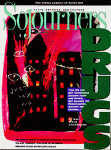A recent study by researchers at the National Cancer Institute, the Centers for Disease Control, and the Washington, D.C. Commission on Public Health found that AIDS cases in the capital likely will triple within five years. From a total of 3,500 cases last year, 10,000 District residents are expected to have AIDS by the mid-l990s.
This preview of Washington, D.C.'s immediate future constitutes more than a wake-up call; it is a fire alarm that should shake us out of our somnolence and neglect toward the pandemic that grips this city, the entire United States, and the rest of the world. The capital gives witness to a deadly disease now present in 163 countries and, according to World Health Organization projections, destined to infect as many as 40 million people by the year 2000.
Those working directly with AIDS sufferers—particularly those in the gay community—have known the extent of the crisis for years and have desperately tried to focus society's attention on it. Today the virus cuts across all lines in our society. While still devastatingly high among homosexual and bisexual men, the number of new AIDS cases among heterosexuals in Washington, D.C., will explode by 1995, according to the study; drug users will account for more than half of all new cases. The number of D.C. children with AIDS is expected to grow from about 500 now to nearly 1,300 by 1996.
These projections give serious pause to those involved in caring for persons who are HIV positive or have AIDS. One clinical psychologist with an already full case load, on top of group work and supervisory responsibilities, wonders if his burden—and that of others in similar positions—will triple in the next five years.
When an Arthur Ashe announces that he has had the virus for several years, Americans at least for a moment glimpse the pervasiveness of this scourge. The extent of the disease in the United States was summarized by a medical doctor who works in the field: "The country has AIDS." By that token, increased effort against the disease is incumbent on all sectors of society, including health care providers, social service agencies, public officials, churches, and families.
But such effort is not a given, despite the enormous threat that AIDS represents. A staff person at the Washington, D.C. Whitman-Walker Clinic—which cares for people with AIDS, most of them gay men—insists that we must first overcome our "sex-phobia": America's propensity for using sex to titillate, attract, advertise, and sell while refusing to face up and deal with it in wholesome, healthy ways. This results in grave neglect of the root causes that are producing the exponential growth of AIDS.
As if to underscore this point, recent news stories report that basketball superstar Earvin "Magic" Johnson has threatened to "step down" from President Bush's National Commission on AIDS "if he's [Bush] not going to do anything." There is simply not the political will for the infusion of money and resources necessary to do effective research on the virus.
Special responsibility for education and preventative counseling lies with the churches. Yet by and large they have not taken leadership in this matter. According to Bill Johnson of the Washington, D.C.-based AIDS National Interfaith Network, only the United Church of Christ has a full-time person on AIDS issues. Some churches show great reluctance to address what Johnson calls "language-specific" education of parents and children about sex and AIDS. (Traditionally, conservatives have blocked the kind of concrete education needed to combat AIDS.) Some churches quibble over the licitness of condoms—which are admittedly not a comprehensive solution—while others hesitate to counsel abstinence for fear of being considered out of touch.
The AIDS pandemic here and abroad both challenges churches and provides opportunities for them to do what they should do best. Sermons on the causes, prevention, and treatment of AIDS need to be heard from every pulpit. Sex education must be urged as the moral responsibility of parents and teachers. And as public institutions the churches ought to press local, state, and national governments for serious programs seeking prevention and cure.
Dr. Scott Harris, a Maryknoll priest who spent three years in East Africa treating people with AIDS, called this a "graced moment" for the institutional churches. If ever there was a situation crying out for compassion, the AIDS crisis is it. Once again we have before us "life and death, blessing and curse." God's call—again—is for us to choose life.

Got something to say about what you're reading? We value your feedback!